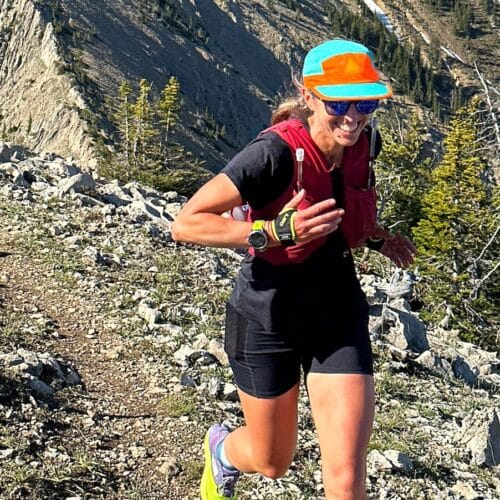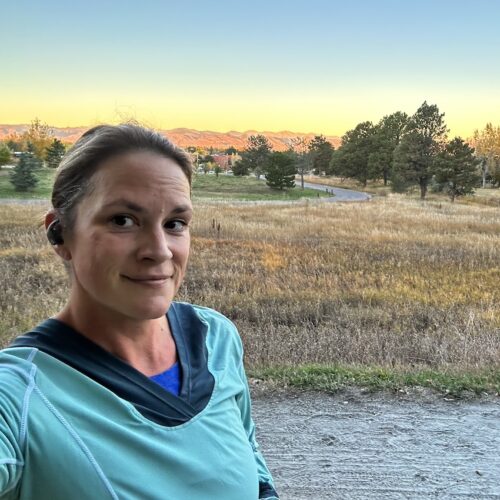Main Menu
How do you know when you should legitimately call it quits from a hard fall/nagging injury vs. sucking it up and continuing the race?
How close are you to the finish? Is it getting worse? Do you feel like it will cause long term damage? I face planted 15 miles into a 50K and smashed my forehead on a rock and shredded my entire leg. I was dripping blood everywhere but an EMT checked me out at an aid station and said its up to me so I went for it. I felt like crap though. If it had been a longer race or worse injuries I may have stopped. You have to trust yourself on this one, take it case by case and if there is any doubt seek medical help. Health is WAY more important than racing!
To me, it’s all about body mechanics and whether I’m starting to feel a “sidedness” to whatever’s going on. If I can’t even out my gait, or one side starts to fatigue, AND I have more than 2 hours to go, I’ll call it. If it’s borderline, and I can even things out, even in short spurts, I’ll keep going. I know it’s a mental game at that point. Spending time with your thoughts while training is excellent preparation. Then you will know the difference between “I can’t do it” and “I’m endangering myself by continuing”. Mental prep is crucial in this area. Get to know yourself and your limits. Practice pushing past perceived reasons to quit and understand how to interpret those under duress.
Ask yourself: “Will I hurt myself long-term if I continue onwards?” If the answer isn’t a resounding no, you should probably stop. I had 7 miles left of Western States last year and I couldn’t stand up or bend one leg. Of course I wanted to finish, but I could’ve ruined the rest of my year (or many years) had I dragged my ass to the finish line. It wasn’t worth it, let alone possible. Be realistic! No one cares if you DNF for a good reason.
This is an important question because it can either result in preventing further injury or sidelining you for months. I always think back to my first running injury. I had a minor slip on the side of a trail and felt a sharp, sudden pain on the backside of my groin. Of course it happened the week that I was supposed to go out for a 35 mile race. I went out the next day for another maintenance run thinking that it was just a slight muscle pull and that maybe a lighter jog would help sort it out. Nope. Later that day, I couldn’t even lift up my leg to put my shorts on. I freaked, went to my PT and had her do all the needling and taping she could, but things just progressed even worse. I made the tough decision to bag my race, even though I had been training for it for months and I’m glad I did because an MRI confirmed that I indeed had suffered a pelvic stress fracture. If I had even attempted to run on it, it could’ve been A LOT worse. In the case of nagging injuries, it’s all about respecting the boundaries. Running is already meant to be uncomfortable sport, but further agitating pain, especially if it becomes debilitating isn’t worth the injury time later down the road. During a race, it’s hard because we’re already in the zone, we don’t want to sacrifice all of the time and training that’s gone into it and sometimes, yeah, it’s better to suck it up and push through. However, calling it quits because of worsening pain, doesn’t make you a wimp, it makes you a smarter runner. Running will always be there, trust me.
Unless the injury involves broken bones, sprains or potential for long term harm, the decision to call it quits or push through injury isn’t always clear cut and there isn’t always a right or wrong answer. If you’re not in serious danger, then you should ask yourself if you’re willing to get to the finish at all costs or if hobbling for another 30 miles while your IT Band screams at you is just something you’re not willing to put up with. Slight injuries and pains will always pop up during a long race and it’s important to not get in the habit of only finishing if and when everything is pleasant and peachy. Part of the challenge of ultra running lies in making these kinds of decisions! I wrote a piece for Trail Sisters a while back about some lessons I’ve learned that have helped get me to the finish line . My number one piece of advice is to not rush into the decision to quit — don’t announce “I’m done!” the second you walk into an aid station even if you’ve been dwelling on it for what feels like an eternity. Use the aid station volunteers and your crew to help you assess and evaluate what’s going on. Can they help you clean and bandage the wound so you can continue? Can you use KT tape, ice, stretching or massage to help loosen the nagging injury? Can you reboot before you shut down?
I feel like this is a tough call, especially as endurance athletes with the mentality to push through everything. There are a few things I would consider though:
- Is it extremely acute? I hope it goes without saying, but if there’s a fracture, profuse bleeding, etc. you should probably stop.
- Is it getting progressively worse a you run? If it hurts when you run, but seems to remain constant, you are probably ok to continue. If it keeps getting worse you may be doing further damage, in which case you should stop.
- Is it changing your gate? We all can get a little stiff and wonky over the course of a race, but an injury is going to make you significantly change your gate, which can lead to problems elsewhere. The more your thrown off, the more you should lean towards stopping.
- Where are you in the race? Obviously, limping or walking in the last 3 miles makes a lot more sense than limping in the last 53.
- What is your purpose in running the race? I had one race where I was injured, but I had multiple reasons for why I just wanted to finish the race. I made the decision to continue knowing I was making it worse and that I’d have to take time off after the race to heal, but knowing for that particular race it was worth it for me.
When it stops being fun. That seems overly simple, but if I’m not enjoying the time + effort I’m putting into running I swap the running shoes out for something else [hiking boots, splitboard, snowshoes, cycling shoes, etc].
If you cannot bear weight you need to stop. If you are limping and have a long push ahead of you, you are going to cause a a whole slew of other issues that could pull you back from activity a lot longer than just your one acute injury.
If your pain is greater than a 4/10 (0=no pain, 10= emergency room level), sharp, and getting worse as you continue that’s too elevated and means you need to stop.
If you take a hard fall, take a minute and let your nervous system calm down as you are likely in “fight or flight” mode. Check for bone tenderness, lacerations, or signs of major swelling and/or deformity. If none of those are present, start with a light walk and see if your pain subsides to less than a 4/10. If it does and continues to improve with movement, you should be fine to persist. Always a hard call, but better to be safe than sorry!
I think we’re all looking for someone to answer this question for us, to relieve us from the pressure of possibly making the wrong decision. But here’s the thing: there’s never one single answer, because it’s different every time. As with any choice, one must consider all the information at hand and apply it to each unique situation with its unique set of circumstances. Here’s an example: I once sprained my ankle at mile 40 of a 100 and continued. I ended up injured for months and months afterwards and regretted it, but at the time, I thought the horror of not finishing would be worse. I was wrong, and put the experience in the memory bank, vowing never to do that again. Fast forward to this past summer, during the Hardrock 100, a race that took me 7 years of applying to get in. My dream race. At mile 85, the back of my knee was hurting so bad I could barely straighten my leg while climbing. I knew that continuing the race would likely cause a lasting injury. But because finishing was worth it, and because I knew that I’d be fine with taking some time off to heal afterwards, as I was wanting to take a break to have kids – I kept going. It did lead to a bigger injury and I am still working on recovering it fully 8 months later. But I have no regrets, and am still happy with my decision. However, I can’t say that I would have made the same decision if it wasn’t Hardrock, in fact, I know I probably wouldn’t have. I think all we can ever do in these types of situation is trust ourselves and then deal with the outcome regardless. Sometimes we’ll make the right choice, and sometimes we’ll make the wrong one – but we continually gain more personal evidence for our future decisions throughout our running careers.
Often times, a “DNF” is felt as a massive failure to a runner and a reflection on his/her mental and physical toughness. We worry what others might think or how it would affect our ultra-signup scores. However, while as legit as those feelings are, there is no truth to them, and your performance doesn’t influence you as a person. At the end of the day, running and racing should bring you joy. If you are in pain that could potentially threaten long-term running, there is no reason to continue on. You don’t have to prove anything to anyone. But if you are unsure, visit an aid station and take a moment to assess the situation and get advice from a medical professional. They will help you make an informed decision, not one based on solely emotion.
Leaving a race is one of the hardest things to do, but it ultimately can be the wisest. This is easier said than done, but to do so, you need to rule out all the voices in your head that might come from pride, stubbornness and/or “what will people think”. Make the decision based on your safety, proximity to or from aid stations and ultimately how long you’re okay with being off the trails when you’re recovering. Taking a DNF doesn’t mean that you are weak, it means that you’ve hopefully weighed out all the pros and cons and are making a wise choice based on those circumstances.
The body mind connection is a fascinating subject and plays a big role in how ultrarunners continue to take on longer distances. Listening to your body is key, but when we fatigue in a race our mind can play tricks on us. It will tell us to slow down or maybe a dull pain or “niggle” shows up. Being mentally tough means overcoming these thoughts and feelings. If you have a hard fall, or turnover an ankle it is best to take a moment to breathe and recover. Start to walk, then jog, and if everything feels ok you can usually get right back in the game. If you have a sharp pain that makes you limp with every step you obviously have to evaluate whether you can continue at all. We’ve all had the thought “is this pain going to create lasting damage?” My experience has been mostly the first scenario where I build mental strength by slowing down, realizing that I’m actually pretty good, then pick up the pace and finish strong! I have also experience the dreaded DNF (did not finish) when I had a partially torn Achilles in a 50 miler and a terrible ankle sprain in a 33k. Be sure to know before the race which aid stations are the best location for dropping out if and when you have to find an alternative route to the finish.







